Managing Multiple Projects: The research
This blog is reader-supported. When you purchase something through an affiliate link on this site, I may earn some coffee money. Thanks! Learn more.
What are the key skills for working on multiple projects simultaneously? What tools do you use to prioritize your work? How do you get through the day when you’re juggling All. The. Things?
I posed these questions (and more) to our community and the insights were illuminating. And unfortunately, not in a good way. In this article, we’ll dive into the statistics and you’ll learn:
- The top challenges facing people managing several projects at once
- The key skills required for managing multiple projects
- The top tools for prioritizing work day-to-day
This wasn’t a survey about project portfolio management at the PMO level. Instead, I wanted to know what it’s like as someone who has a workload made up of several projects – because that’s the world I live in too.
Get your copy
Managing Multiple Projects: How Project Managers Can Balance Priorities, Manage Expectations and Increase Productivity is a book that offers a comprehensive framework for juggling your workload and still leaving the office on time.
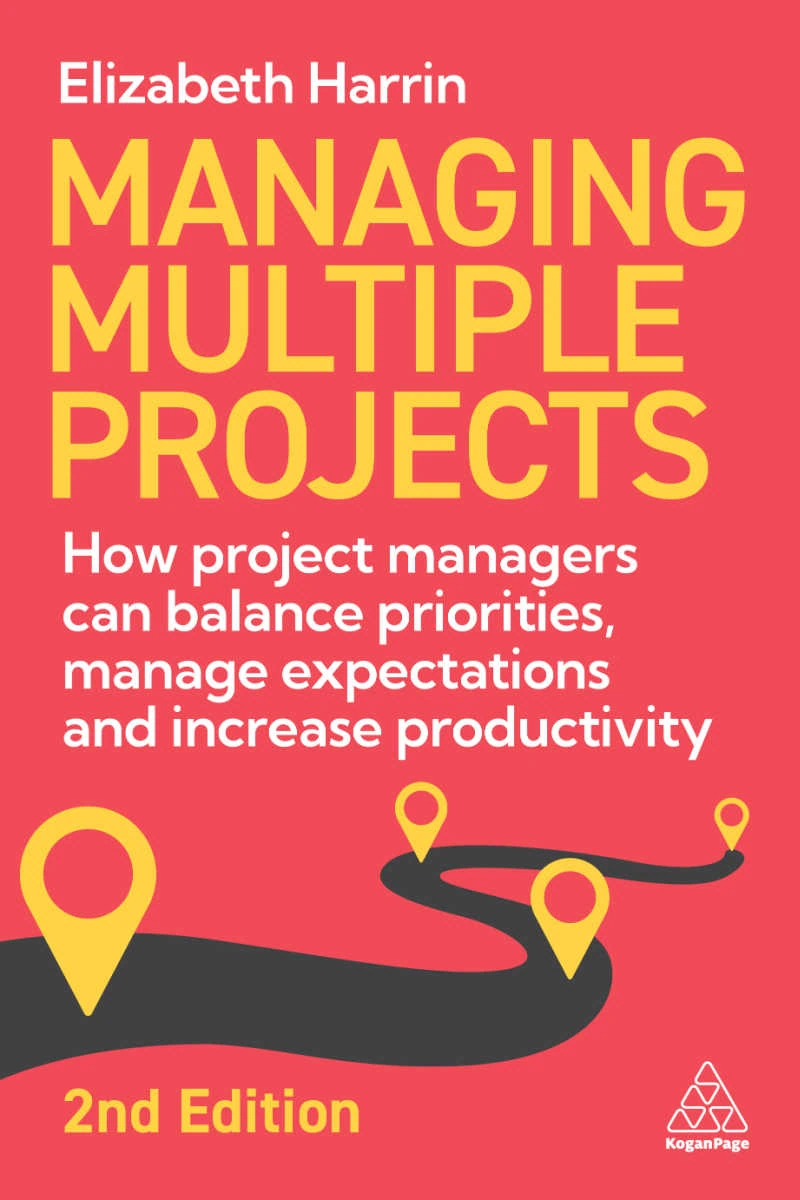
Other research you might find interesting
- Managing multiple projects statistics (2024 research that informed the 2nd edition of my book, Managing Multiple Projects)
- Project management statistics and survey results (2023 study)
- Managing multiple projects research (2022, this informed my book, Managing Multiple Projects — first edition)
- Project management report (2021, this research is where the much-quoted “most project managers lead 2-5 projects” statistic comes from)
As someone running several projects at a time, which of these challenges do you face?
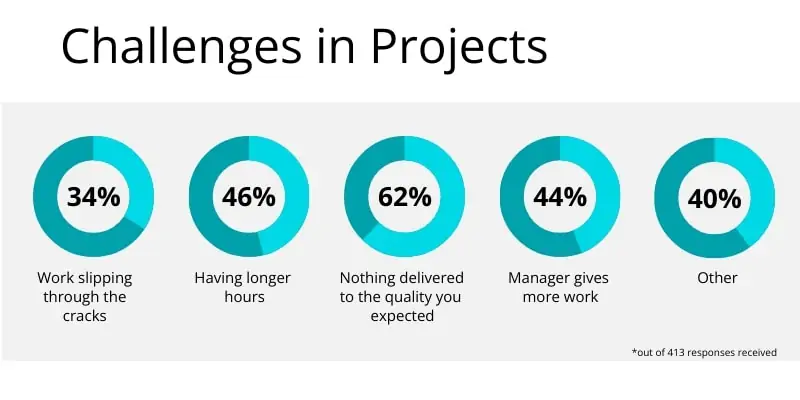
The biggest challenge for people leading many projects is that they feel like nothing is being done to a good enough level of quality due to time pressure: 62% of respondents said this was an issue for them. Project managers want to do a good job, and when things are busy and you have multiple balls to keep in the air, that’s tricky. Tasks get done – but they don’t necessarily get done to the standard we’d like. Everything is a compromise.
“It gets very difficult to keep up with timelines AND quality,” one respondent added. “Trying to cut scope or ask for more time are the only options if you want to keep up with quality.”
“For me the difficulty is that management doesn’t make a decision up front as to what’s important but rather waits until the umpteenth detail is known with a lot of time wasted to decide not to do it,” wrote another. “Repeat the next year.”
The next biggest challenge reported was working longer and longer hours as time goes by (46%). That could be to do with the fact that 44% of project professionals reported that their manager giving them more work.
“New work is being assigned without being reviewed for priority or as part of the long term strategy/plan,” wrote one project manager, and many others added similar comments about the lack of organizational portfolio management, like these:
- Poor strategy planning hence poor implementation in order to realize benefits sought.
- Other corporate requests are not coordinated so I am trying to do my program work whilst being bombarded with multiple other requests/deadlines.
- Competing priorities where everything is considered priority #1.
What’s that saying: If you want something done, give it to a busy person?
Project managers are busy, and we’re good at getting stuff done. We’re a safe pair of hands for managers to delegate to, and more often than not we deliver.
Work is falling through the cracks
About a third of project managers (34%) report that work is slipping through the cracks and that’s a challenge for them as a professional leading multiple projects – no one wants to drop the ball.
Case study
“The example I am thinking of is a situation when I had 2 projects with different sponsors but stakeholders overlapped. The difficult part was one project hit some issues early on and I was being pulled by that project more because of that. The sponsor for the other project raised concerns about his project falling through the cracks because of that (it didn’t and his noise caused more work and frustration).”
Anonymous project manager
What are the key skills for managing multiple projects?
There are as many ‘key skills for managing projects’ lists as there are researchers who have asked people what they think are the top skills. However, this particular study turned up some interesting insights as you can see from the graph below.
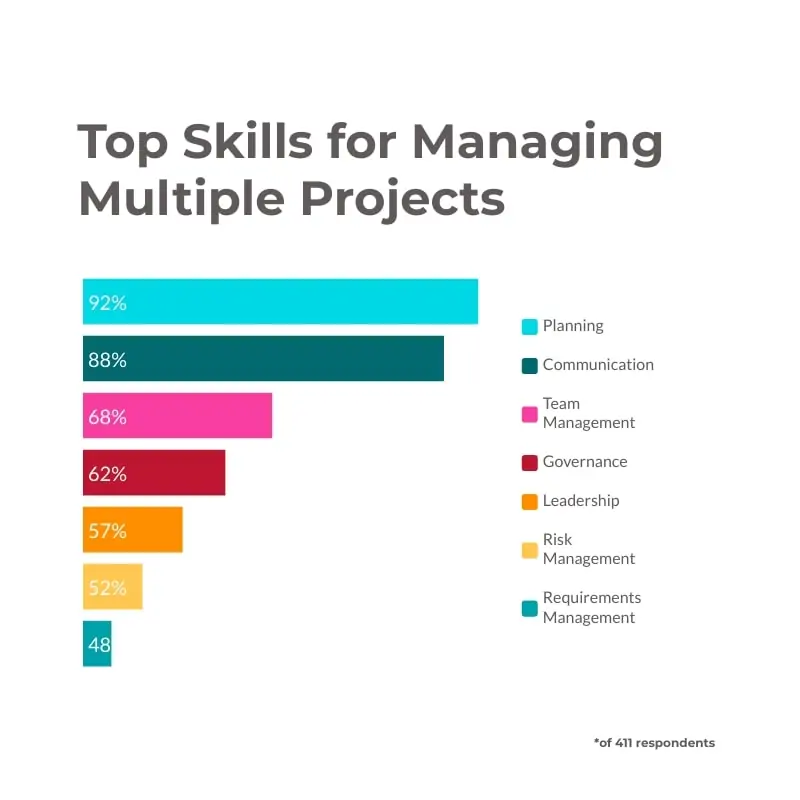
Planning is the top skill identified as being able to manage multiple projects, closely followed by communication and stakeholder engagement.
Nearly 70% of project professionals thought that team management was crucial, with 62% reporting they felt project control and governance was key.
Survey respondents recognized over 60 different skills, from attention to detail to vendor management. Here are some of the verbatim responses:
- You should really be a skilled PM before managing multiple projects. Building relations and cross-coordination between more projects are important.
- Organization is also a key skill when it comes to managing multiple projects!
- Self-care – i.e. taking on only what can reasonably be delivered without burning out.
- Proactivity and ownership.
- Political awareness. Ability to use a crystal ball particularly in a global pandemic.
Case study
“I had two major projects that were at different stages. One internal department ITSM launch nearing implementation using ICT resources only who struggled to prioritize time to complete tasks due to BAU and supporting the corporate customer need plus other internal ICT projects. We didn’t have the benefit of resourcing tasks with addition project staff so a drain on people’s time which led to realigning the implementation date (which we had in our gift). Unfortunate that we didn’t have resource to take time to implement something well for ourselves as in place to assist corporate customer and we couldn’t meet the expectations and control that we normally demand from the business customer. We were the business customer but knew where our tolerance was and cut corners which isn’t how you should run projects.
“The other project at the time was in the initiation stage with an external customer in partnership. This had a higher priority and required the same resources and it was deemed for this to take priority which was frustrating for the resources involved as we couldn’t prioritize our internal need.”
Anonymous project manager
What techniques do you use to prioritize your work?
Prioritizing work when you have more than one project running at the same time is a challenge. We all know that some stuff is intrinsically more important, but it’s hard to have the argument with a senior executive who wants tasks for their projects to be completed by yesterday.
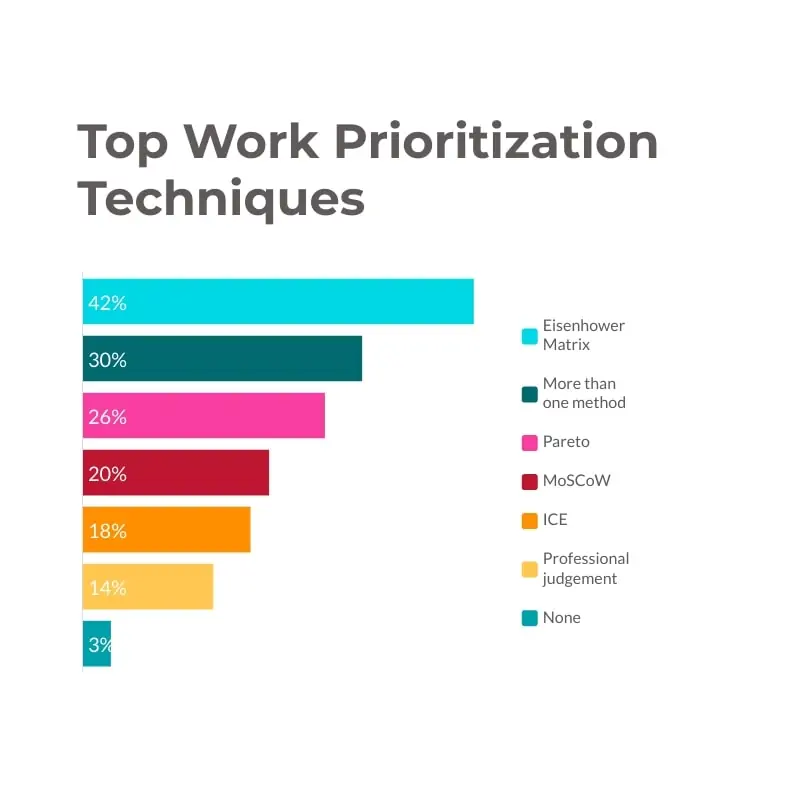
So how do multi-project managers choose what to work on?
The urgent vs important matrix (also known as the Eisenhower matrix) topped the list at 42% of project managers reporting they consider task urgency and importance before making the choice about what to get done.
The Pareto 80/20 principle also scored highly, with more than a quarter of respondents reporting that they actively considered the tasks that drive results and focused on those.
Both Eisenhower and Pareto require professional judgement, so it’s no surprise that there were so many project managers who responded to the survey with verbatim remarks that reflected that.
Responses ranged from:
The numerous enterprise /PMO metrics which are measured on a monthly cycle combined with reporting out to the stock market every 12 weeks.
to
Literally, it is whatever is on fire today.
Ouch.
Here’s a selection of what people had to say about how work is prioritized in a multi-project environment.
- I have to write things down. I have a ‘to do’ book, lists of things to do, the bigger/more asterisks, the more important. And if urgent I move things through to the ‘do today’ list – sort of Eisenhower but not as structured.
- My own work: gut feeling. Team’s project delivery tasks: MoSCoW
- Which client is screaming the loudest …
- Whoever yells the loudest? (It’s horrible and embarrassing to admit, I know!)
- No real formal tools used, it’s often ‘gut feeling’ or management determination based on project constraints.
- I just have a list I maintain with dates and notes.
Case study
“One difficult experience comes to mind where we were creating a touchless check-in application for visitors. There were 3 different systems that needed integration and the Engineering Manager thought it would be good experience for a junior developer to work on the project. What was initially estimated to take one quarter, ended taking 4. The frustration came where this developer was very green and didn’t have the experience needed for such a complex project. The senior developer put in charge to mentor her was very hands off and ended up leaving the organization. After raising my concerns several times to both of the Engineering Managers, it seems everyone was just too busy on their other projects to give her the time needed to help her complete the project (thus finishing the work in 4 quarters instead of 1).
“With all the “busyness” I tried several times to ease team-lead and Engineering Managers burdens by attempting to delay their current projects so they could help the junior developer finish the project, but with all of us working remote, it just didn’t seem to pan out. They would say in meetings that they would help her, but just kept getting too busy to make the time.
“I documented this as a risk, and continued to communicate it up the chain to leadership, but nothing changed. Time went on, and she finally finished the project. She did receive some help from other developers at times, but I was astonished that her direct managers did not provide more guidance.
“In the future, when I see projects that require multiple system integration, I will push more for more senior/experienced resource, and ask that if a junior developer be assigned to the project, require they pair program with a senior developer and actually assign that project to the senior so they are the one accountable/responsible, instead of the junior. I will also make sure the team has a better understanding of how all the systems will be affected and increase the estimated development timeframe to accommodate the unknown for complexities when it comes to integrating multiple systems.
“I think the demands on project managers these days to be the best at communication, problem solving, emotionally high IQs, leadership skills, etc. etc. is incredibly difficult to maintain and achieve. Even if one person is able to harness all those qualities, that still doesn’t make up for the rest of the team needed to make a project successful. You can lead a horse to water, but you can’t make it drink! A project manager needs the team to also have those qualities of excellence to be a success!”
Katherine
What stops you from being productive?
The survey also asked about productivity killers and what gets in the way from being able to do the best work possible in the time available.
It was surprising to see that procrastination (putting off doing tasks) came out top with 34%. For people who confess to being busy and overworked, it seems odd to delay doing the work, but procrastination is the result of many issues, not least being so overwhelmed that you don’t know where to start.
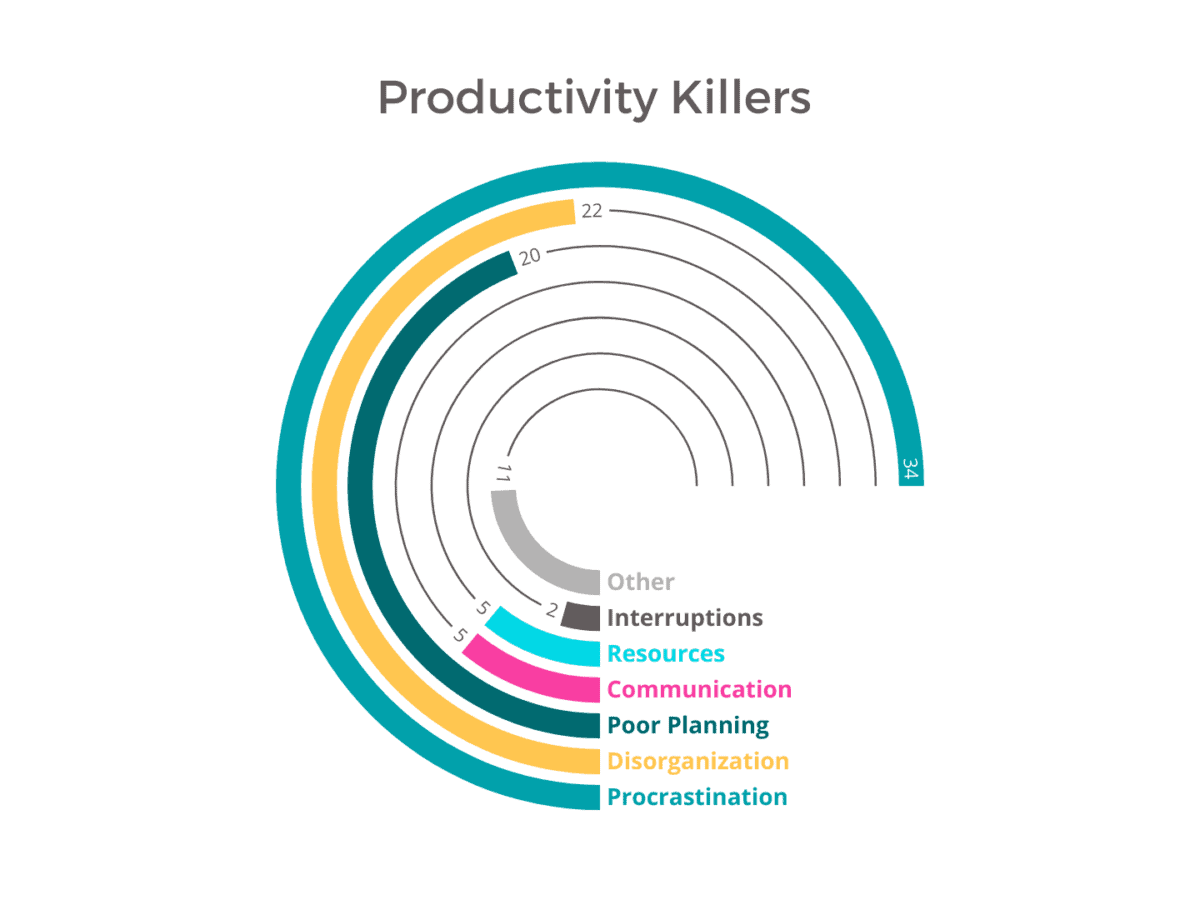
Over a fifth of respondents said that disorganization was an issue for them: not being able to find their files or wasting time looking for things or doing work unproductively due to not having everything to hand.
Poor planning – not knowing what should be done – affects one in five project managers.
The story I take from this is that the multi-project environment is overwhelming, complex and changing. It’s hard to plan when priorities change daily and your To Do list is getting longer and longer.
Some of the other reasons for not being productive included:
- Death by Meeting: the vendor scheduled multiple meetings every week with overlapping agendas. Too much time spent talking and not enough time to actually do the work.
- Decision makers can’t be reached, delays until we get the yes or no on direction.
- Inability to have meaningful, timely conversations with stakeholders because of scheduling conflicts, time zones, and lack of urgency for some in the group.
- Lack of focus which leads to mistakes, missing things are not being organized. Feelings of firefighting projects rather than managing them.
- Multiple fires, team members not meeting deliverables, having to include everyone in decisions before moving on.
- Peri-menopause messing with my head so having to spend every morning recapping where I am on each workstream and every evening setting up myself an overly complete handover. Also duplication of tasks that I don’t remember I’ve already done.
How do your projects relate to each other?
How do you work on several projects at once and still keep your sense of humor? Well, being able to think about projects in buckets helps. Categorizing the work into ‘Client X’s projects’, ‘Transformation initiatives’ ‘Construction projects due in December’ and so on helps you see how they relate.
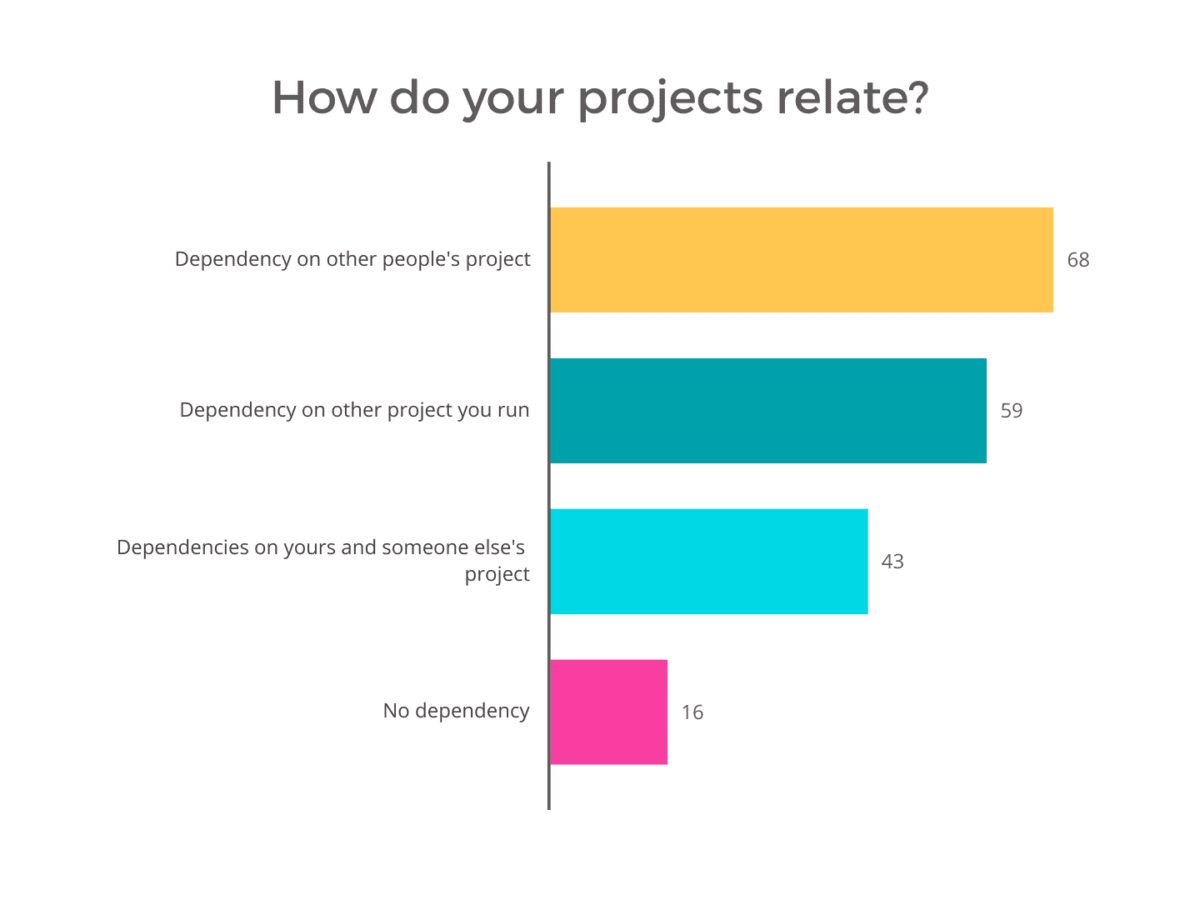
In the survey, 59% of project managers reported leading work that was dependent on other projects they were running. This should be a good thing, because you can more easily identify the impacts of any resource or time constraints and juggle things around within your workload to deal with them.
Nearly 70% of respondents said their projects had dependencies on other people’s projects, and that’s tricky. When you are reliant on other project managers, there’s a lot more communication, negotiation and juggling to do to make sure both your project and their project still hits all the expected deadlines.
It’s also common to have to juggle both types of dependencies: 43% of professionals said they handled a personal portfolio that required them to both manage dependencies between projects they were leading and those that others were leading. Only 16% of people reported only running projects that had no dependencies on any other projects.
Case study
“It’s very difficult to make a case for why your opinions should matter when others don’t have the big picture view of repeat issues, e.g. Engineering isn’t doing enough QA testing. Program managers are treated more like secretaries than like experts in their field. I’m becoming more and more aware of the sexism in this job. And how many men I have to convince that my opinion counts just keeps growing. They are getting promoted while I sit here holding the bag. What am I doing wrong?”
MJ
How do you streamline your work?
Two of the techniques I teach for managing multiple projects are merging meetings and consolidating risks.
Over 80% of project managers do not consolidate risks across multiple projects to see if the combined effect of a risk is greater than individual effect. That is not surprising: project risk management is not currently taught in that way. Creating a consolidated risk profile is something typically done by the Project Management Office to show the overall risk exposure for a portfolio across a department or division – not by project managers.
Nearly 30% of project managers do not combine project meetings where it makes sense to do so.
There are opportunities for teams that don’t consolidate risks or meetings to consider whether doing so would win them back some more time (I think it would). Having said that, I agree with what one Kris wrote in the survey responses: “No amount of project management will help with overload of work. Sometimes projects must be cancelled or put on back burner and that’s okay.”
Case study
“I’m right in the middle of a startup with my company. Expectations are constantly moving around. 13 official projects. I’m barely keeping it together. Oh and we’re most likely changing our project management software. No big deal. To summarize, I’m in the thick of it. Managing personalities and expectations is probably my biggest issues. Some stakeholders want to know exactly what to do and how to do it. The others go off on their own without a plan of attack. I schedule regular meetings with my stakeholders for all updates. I at least feel in the know about information.”
Sara
What this means for project management practice
You guys are amazing. I’m in awe at what people manage.
At the same time, some of the stories are awful. People who left jobs because of the workload. People who are trying to protect their team’s well-being because the organization itself doesn’t seem to care.
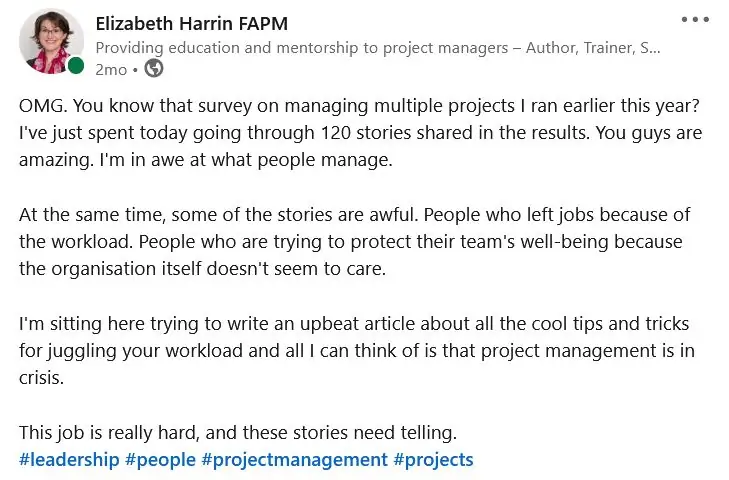
There were lots of comments that were hard to read: people being under-appreciated and overworked. People struggling with poor management and lack of a strategy.
Project management is a great job, but only when it’s a great job. When the other pieces aren’t there, it’s a hard slog to get anything done. Sadly, today it feels like it’s mostly slog. The role of the project manager is in crisis.
For every celebratory story in lists like PMI’s most influential projects, there’s a project manager crying on her way home from work, or handing in her notice because it’s too much, or struggling to get a seat at the table, let alone a voice.
All the project management training I’ve ever done has focused on how to manage one project, with the expectation that you can simply repeat everything for all the projects you manage.
There’s a gap between how project managers are trained today and what the real-life expectation is for someone doing the job – a gap I can help you fill with my Managing Multiple Projects book or course (if you prefer to learn like that).
Let me help you juggle all your work. I can’t magically make your boss understand what the role of a PM is or help your company develop (and stick to) a set of strategic priorities. But I can help you feel more in control of your own workload and more equipped to talk about how stretched you are.
Notes on the research
This article is based on data collected from an online survey conducted during 2021. There were 413 responses from people self-selecting to take part and identifying as project professionals in some capacity or other. We did not collect demographic data (age/gender/location etc) but instead focused on meaningful questions that would provide insights into what it is really like to work on multiple projects simultaneously.
Get your copy
Managing Multiple Projects: How Project Managers Can Balance Priorities, Manage Expectations and Increase Productivity is a book that offers a comprehensive framework for juggling your workload and still leaving the office on time.


